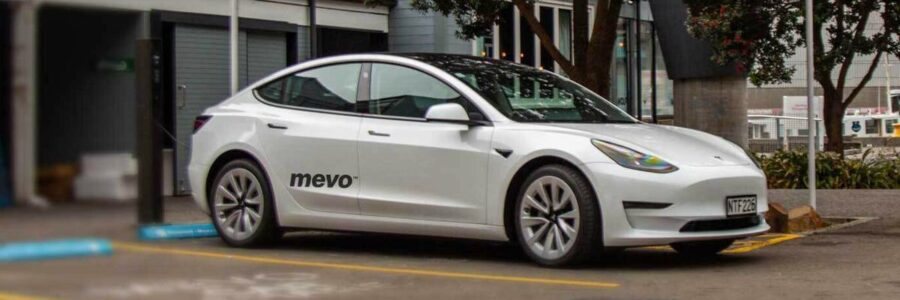
A battery of Teslas: Car-share firm Mevo buying 120 EVs, readying Auckland launch
Mevo has launched a new “virtual fleet” service today based on Tesla’s Model 3. The idea is that a company-owned carpool is replaced by EVs accessed on-demand.
The company is spending up large on electric vehicles from Elon Musk’s company as part of its commitment to buy 120 pure-electric vehicles.
Wellington and Hamilton businesses can sign up to a virtual fleet subscription from today to access the Teslas. They will be available for public use from February.
The service will be launched in Auckland “soon”, founder and chief executive Erik Zydervelt says.
His firm’s 120 EV push is funded, in part, by contestable grant money from the
Energy Efficiency and Conservation Authority. The Crown agency has awarded Mevo just over $1m over three funding rounds.
Under the new virtual fleet service, an $800 per month Anytime plan will include eight days of Tesla Model 3 rental per month, including evenings and weekends.
A $950 Business Plan includes 20 days of Model 3 between 8am and 6pm on weekdays.
Mevo’s casual pricing includes 60c-per-minute and $15-per-hour options for casual customers, who can locate and unlock its cars via its app.
Zydervelt said it’s possible there will be brands beyond Tesla in the mix for its 120 EVs, but at this point no other electric vehicles are in the frame. The Audi A3 e-tron has been the stable of Mevo’s EV fleet so far. Mevo also has petrol cars in its fleet.
Along with other EV makers, Tesla has seen sales boom since the Government introduced its Clean Car Discount in July, which delivers rebates of up to $8625.
In September, one in five new vehicles registered was an EV, with Tesla’s Model 3 (1066 units) leading the field ahead of the MG ZS (122) and the Hyundai Kona (84). Although ute sales have also been strong as buyers look to get in ahead of the introduction of the “dirty vehicle tax”, the Model 3 still outsold Toyota’s Hilux (684 units).
Zydervelt said while the Clean Car Discount helped, the ECCA funding was the bigger spur for his firm’s 120 EV drive.
Mevo is also backed by Z Energy, which has built a 32 per cent stake in the company (a theme that’s mirrored at car-share rival Zilch, which is now 40 per cent owned by Genesis Energy).
There have been three big milestones for Mevo.
The first was in 2018, when it negotiated a “free-floating” deal with Wellington City Council, meaning a Mevo vehicle could be left at a public carpark around the CBD or airport – a departure from the industry’s return-to-base model (still used by Cityhop in Auckland).
The second was in late 2019 when Auckland Transport released a new policy for car-share operators. It included the free-floating carpark vision that Mevo had been lobbying for (and Cityhop arguing against), plus subsidised car parks. The firm was all set for its Auckland launch – until the pandemic hit. Zydervelt says it will now launch in the city in the first half of next year.
Then you’ll be able to forget picking up a car-share vehicle in Hobsonville Point (to take a random example) then having to drop it off at the same designated car park in the same area. You’ll soon be able to pick up a car-share vehicle in a far-flung suburb then drop it off in the CBD or at the airport (a service Zilch is already operating in the city).
The third was in March this year when Mevo entered the Hamilton car-share market by buying Loop from Waikato-based dealership Ebbett Group. Mevo did not put a price tag on the deal but said it included a $30m vehicle supply agreement with which will go toward “further expansion of the Mevo fleet”.
Although its Auckland launch won’t be until the new year, Mevo has already signed a customer with offices in the city: Beca Group (which also operates in Wellington and Hamilton, plus other centres).
Beca Group director Amelia Linzey said, “As part of our business commitment to reduce our carbon footprint, we’ve been looking at ways to minimise the number of vehicles needed within our company.”
BioGro and Jerram Tocker Barron Architects are among other early adopters of Mevo’s virtual Tesla fleet.
Energy Efficiency and Conservation Authority transport manager Richard Brigg said, “EECA is proud to support Mevo with the launch of their virtual fleet product. While business travel is often unavoidable, maintaining a fleet can be costly and inefficient. Giving organisations a new fully electric way to ensure their staff can get around helps demonstrate how we can cut our transport emissions, which is critical to tackling climate change.”
Earth-moving
During a recent speech to the Apec CEO Summit, Tesla chair Robyn Denholm said her company had a key role to play in emissions reduction.
But she also warned, “To meet the world’s COP decarbonisation targets, lithium-ion cell production will have to grow by 23 times from its current level by 2035.”
Denholm called on governments to co-invest in lithium and nickel mining – opposed by some environmentalists – to help ensure a supply of batteries for the booming EV market.
A Trustpower report said around 40 new, grid-scale, generation and batteries projects required, budgeted at $50m per year from 2030, to support electric vehicle update and other decarbonisation projects.
But it also said that the average household’s total energy bill would drop by 25 per cent by 2035 because EVs (whose charging cost is the equivalent to paying 40c a litre for petrol) are cheaper to run than ICE vehicles.
Source: Read Full Article
/cloudfront-ap-southeast-2.images.arcpublishing.com/nzme/UMAIONV43LVWWHSIEETBSYYZ7A.jpg)
/cloudfront-ap-southeast-2.images.arcpublishing.com/nzme/I3SROBTSG5YHOYWEHY7BKSAMYU.jpg)